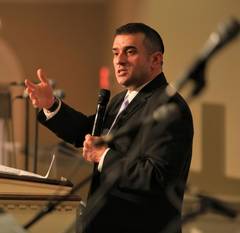- About Us
- Learning
- Resources
- Get Involved
- Membership
- Jobs
Divine Movin' and Groovin'
03/26/2019 02:47:58 PM
| Author | |
| Date Added | |
| Automatically create summary | |
| Summary |
 Some of Judaism's original innovators were Nadav and Avihu, the sons of Aaron the priest.
Some of Judaism's original innovators were Nadav and Avihu, the sons of Aaron the priest.
Back at the dedication of the ancient altar in the desert, which we read about in this week's parsha, Shemini, they offered "a strange fire" before the Holy One, a fire which He had not commanded them, and then, a fire came forth from the altar and devoured them. (Lev 10:1-2)
By and large, the Jewish tradition views their death's as punishment for their hubris. The Holy One had given fairly specific instructions on how to worship, and here were these two knuckleheads coming up with their own ideas. They got the punishment they deserved!
But, the rabbis made a fascinating choice when they selected the prophetic reading, or haftorah, to go with this story.
In it, King David brings the holy ark into Jerusalem and in his joy, ditches his royal clothes and dances and turns somersaults before all the people. Nobody told him to do this, and he certainly wasn't commanded to do so by God.
Yet when David's wife Mychal chastises him for conduct unbecoming a king of Israel, he responds tartly, reminding her that he was chosen as the king of Israel and he will be "yet more vile than thus" in his devotion to the Holy.
So, in the Torah reading, we seem to be told that the path to God involves sitting nicely and doing as we are told, and in the Haftorah, we seem to be told that we are to listen to our hearts in service of the divine, even if that means turning devotional summersaults.
When are we to obey tradition and find our spiritual sustenance in the ways of our ancestors, and when are we supposed to blaze our own path
The ancient rabbis do not resolve this tension, but point towards a resolution in a prayer they put in the mouth of King David.
David said before the Holy One of Blessing: Master of the Universe! At the time when I have the strength to stand before you in prayer and utter my words, give ear; but when I do not have strength, consider the meditations of my heart.
There are times when we do have the ability to access the traditions of the past, to stand before the Holy and speak the words of prayer which we inherit. And when those practices work for us, we should, by all means, make use of them.
And there are, of course, those moments when we can't do that - when the languages we inherit do not speak to us for any one of a million reasons. And then, when those practices don't work for us, we should, by all means, discover new ways, and pray that we can convey the meditations of our own hearts.
May we always be in touch with our own hearts, and may we always be discerning about how to best bring our hearts in service of the Holy.
Thu, October 30 2025
8 Cheshvan 5786
RABBI BRENT SPODEK

Join Our Mailing List
Privacy Settings | Privacy Policy | Member Terms
©2025 All rights reserved. Find out more about ShulCloud


